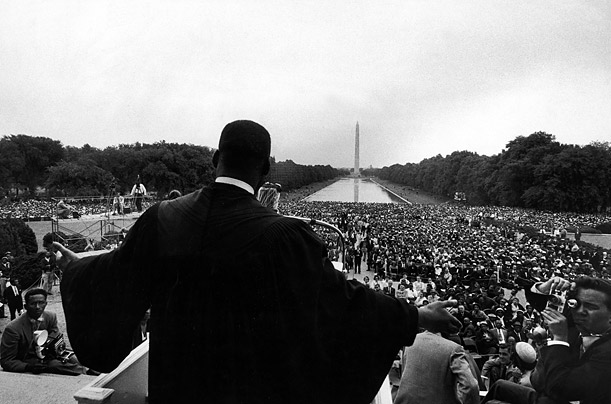Civil Rights: Learning to share power and privilege
January 17th, 2011 Posted in OpinionBy Jess Allen
LOGAN—Nestled in the middle of the Museum of Anthropology on the third floor of Old Main, a small group of listeners gathered Saturday to hear two speakers encourage acceptance and love in remembrance of the Rev. Martin Luther King Jr.
As part of the museum’s “Saturdays at the Museum,” the program focused on “Civil Rights: A New Perspective” to commemorate what would have been King’s 72nd birthday.
• See related story on USU’s MLK Day vigil.
The presenters were Maure Smith-Benanti, Utah State University’s Lesbian, Gay, Bisexual, Transgender, Queer Alliance program coordinator, and Rachel Brighton, a multicultural program coordinator in USU’s Access and Diversity Center. They discussed acceptance and love of those with different perspectives, as well the need to share power and privileges that many people take for granted.
 “We’re taking a slightly different perspective by coming at this at a different angle,” Brighton said. “Hopefully we’ll be looking at this topic in a way you haven’t before.”
“We’re taking a slightly different perspective by coming at this at a different angle,” Brighton said. “Hopefully we’ll be looking at this topic in a way you haven’t before.”
Starting off with quotes by King and Bayard Rustin, a civil rights advocate who influenced King, Brighton and Smith-Benanti shared a philosophy that King called “the Beloved Community.”
The concept was developed by philosopher Josiah Royce but widely popularized by King during the Civil Rights era, the speakers explained. King, who espoused nonviolence, was slain in April 1968.
“The cool thing about what we found in Dr. King’s work is something that is absolutely achievable,” Brighton said. “Is it a perfect world he proposes? No. But is it a realistic possibility? Absolutely.”
King’s vision was a global one where there would be no poverty or homelessness because society’s standards would not tolerate them, she said. The “Beloved Community” would erase racism, bigotry and discrimination, replacing them with a spirit of brotherhood and sisterhood. International disputes would be resolved peacefully rather than with military conflict.
King did not ask that everyone buy into the idea of the “Beloved Community,” Brighton said, but it does take a critical mass of people within society to achieve it and keep it going.
The “Beloved Community” would not be devoid of conflict, she said. King, who was awarded the Nobel Peace Prize in 1964, believed that conflict was inevitable part of the human experience, but that all conflict could be resolved peacefully.
Smith-Benanti and Brighton said King believed in loving spontaneously, and loving people no matter what they believe or feel, what they look like or how they act. To love spontaneously is to love unconditionally.
Being a part of the “Beloved Community” doesn’t mean giving up what an individual believes or values, Brighton said, but rather means making room at the table for others even when they are different.
It is possible to love others just the way they are without having to agree with them, the women argued.
“All of us have something valuable to say. All of us have something that’s important to contribute,” Brighton said. “If we make more of an effort to find that in one another, things begin to change.”
Part of putting the “Beloved Community” into effect is to share power and privilege, Smith-Benanti said.
“A lot of times we think about our power and our privilege as something we have the right to,” she said, “but plenty of times we are simply granted power and privilege.”
Most people in Cache Valley or across Utah or the nation do not realize that what many of the things they view as rights are actually privileges they take for granted, the presenters said.
“I’m one of those people who really didn’t know a lot of this stuff was still going on,” said Melissa Allen, the museum’s Saturday Program coordinator. “A lot of people were still getting discriminated against and struggling, so I’m one of those privileged people who didn’t realize, ‘Wow! these poor people.’”
One way to change things, Smith-Benanti and Brighton said, is to stand up against injustice and to support what is right.
“Power is the legitimate control of or access to those institutions sanctioned by the state,” Smith-Benanti said. “Power is the ability to define reality and to convince other people that that is their definition. Power is the capacity to act.”
Changing the status quo of social power and privilege is difficult, she said. “There are people who have power and have privilege and they don’t give it up,” Smith-Benanti said. “But they give it away.”
Sharing power and privilege will eventually reduce social inequality, she said.
“Social inequality anywhere happens when one group of persons is defined of being more important than another,” Brighton said.
As the presentation concluded, attendees reflected on the ideals espoused by King. Not everyone accepted that the “Beloved Community” concept is possible, but they agreed that it is something worth pursuing.
Not all disputes can be handled nonviolently, audience member Lucas Martin said. “There are leaders like Hitler,” he said. “Hitler could not be loved into submission; there are organizations that require, unfortunately, an intensive front.”
But others endorsed the ideal.
“I think it is a fantastic idea,” said Carenna Martin. “It’s not a new philosophy for me but was a good reminder.”
TP
Tags: Anthropology Museum, Civil Rights, Martin Luther, Rachel Brighton, racism

1 Trackback(s)
Sorry, comments for this entry are closed at this time.